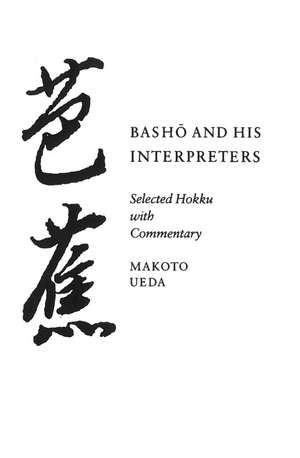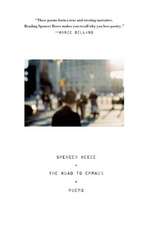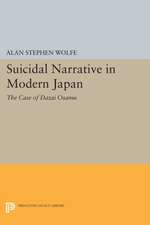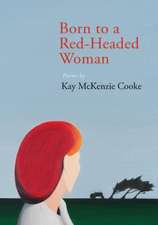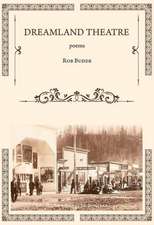Basho and His Interpreters: Selected Hokku with Commentary
Autor Makoto Uedaen Limba Engleză Paperback – 30 apr 1995
This book has a dual purpose. The first is to present in a new English translation 255 representative hokku (or haiku) poems of Matsuo Basho (1644-94), the Japanese poet who is generally considered the most influential figure in the history of the genre. The second is to make available in English a wide spectrum of Japanese critical commentary on the poems over the last three hundred years.
Preț: 299.49 lei
Nou
Puncte Express: 449
Preț estimativ în valută:
57.31€ • 59.98$ • 47.70£
57.31€ • 59.98$ • 47.70£
Carte disponibilă
Livrare economică 10-24 martie
Livrare express 21-27 februarie pentru 46.64 lei
Preluare comenzi: 021 569.72.76
Specificații
ISBN-13: 9780804725262
ISBN-10: 0804725268
Pagini: 468
Dimensiuni: 154 x 232 x 25 mm
Greutate: 0.59 kg
Ediția:1
Editura: Stanford University Press
Colecția Stanford University Press
ISBN-10: 0804725268
Pagini: 468
Dimensiuni: 154 x 232 x 25 mm
Greutate: 0.59 kg
Ediția:1
Editura: Stanford University Press
Colecția Stanford University Press
Recenzii
"The first book in a Western language that conveys the richness, range, genius, and power of Basho's poetry. . . . A gem of a work."—Chanoyu Quarterly
"The knowledge, skill, effort and care put into this book should not be understated. . . . There is much enjoyment to be had from it, for you can open to any page of haiku and you yourself become an interpreter of great poetry."
Monumenta Nipponica
Monumenta Nipponica
"This book contains much wealth for thought as well as for sheer enjoyment. . . . It is a wonderful gift to non-readers of Japanese who aspire to come as close as possible to the 'genius' of Basho's hokku through English translation. . . . Ueda's translations are in the end his commentaries. Moreoever, they are ideal commentaries—at once faithful, foreign, imaginative, daring, and loving."
Journal of the Association of Teachers of Japanese
Journal of the Association of Teachers of Japanese
Notă biografică
Makoto Ueda is Professor of Japanese at Stanford University.
Textul de pe ultima copertă
“The first book in a Western language that conveys the richness, range, genius, and power of Basho’s poetry. . . . A gem of a work.”—Chanoyu Quarterly
